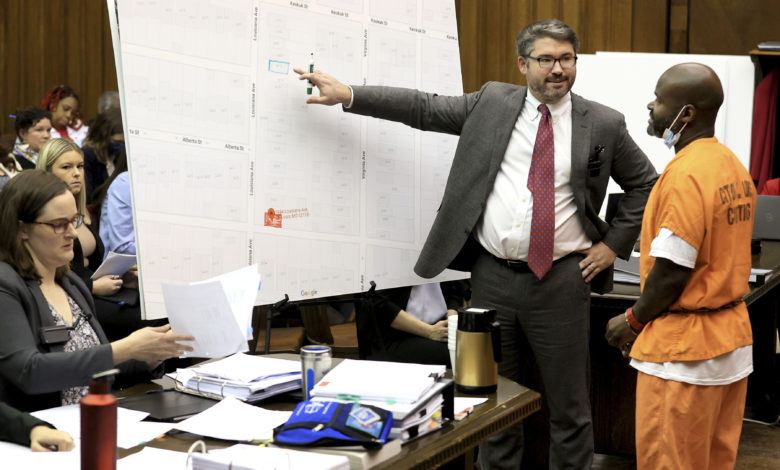Witness who helped convict Missouri man says he was pressured to do so

ST. LOUIS (AP) — A key witness whose testimony helped convict a man of murder and send him to prison nearly 28 years ago testified Tuesday that his role in the case of Lamar Johnson “still haunts” him.
Johnson has contended from the outset that he had nothing to do with the 1994 killing of Marcus Boyd, who allegedly was slain over a $40 drug debt. St. Louis Circuit Attorney Kim Gardner believes Johnson. She filed a motion in August seeking to vacate his murder conviction.
The Missouri Attorney General’s Office argues that the evidence still points to Johnson as the killer. Judge David Mason is presiding over the hearing on whether to vacate the conviction, which is expected to last all week.
Boyd was shot to death on the front porch of his home by two men wearing ski masks on Oct. 30, 1994. Johnson was convicted and sentenced to life in prison. A second suspect, Phil Campbell, pleaded guilty to a reduced charge in exchange for a seven-year prison term. Campbell is now deceased. James Gregory Elking, the witness, told Mason that he was at Boyd’s house trying to buy drugs when the shooting occurred. Elking testified that he couldn’t tell who the masked men were, as he initially told police. He said he was asked to look at a lineup and was then coerced by detectives into naming Johnson as one of the shooters.
“I’m just saying I was feeling pressured, I was feeling bullied,” Elking said Tuesday.
“It’s been haunting me,” he added.
After Johnson’s conviction, Campbell and another man, James Howard, said Johnson had nothing to do with the killing. An investigation by Gardner’s office alleged police and prosecutorial misconduct.
The lead detective, Joseph Nickerson, denied Gardner’s allegations and told the St. Louis Post-Dispatch that he still believes Johnson was one of the killers.
Elking testified that when he was initially unable to name anyone from the lineup as a shooter, Nickerson told him, “I know you know who it is,” and urged him to “help get these guys off the street.”
Feeling pressured and wanting to help police, Elking said that if investigators would tell him who they suspected, he would identify them as the shooters. He said police also provided him with money over the next several months. Gardner’s office has said Elking was given at least $4,000.
Howard, 46, is serving a life sentence for an unrelated murder and nearly a dozen other crimes committed in 1997. He wore handcuffs Monday as he testified that he and Campbell killed Boyd while trying to rob him, because Boyd owed drug money to one of their friends.
Howard said Campbell shot Boyd in the side, while Howard shot him in the back of the head and neck. He said they didn’t shoot Elking because they didn’t think he could identify them.
“Was Lamar Johnson there?” Potts asked.
“No,” Howard answered.
Howard said his guilt over Johnson’s conviction prompted him to first come forward two decades ago to try and help Johnson get freed.
“I was trying to right my wrongs that I had done him,” Howard said.
Assistant attorneys general, in cross-examinations, sought to raise discrepancies in the witnesses’ testimony. Among them: Elking now says the shooters calmly walked away after the shooting, but in a 1995 deposition he said they ran away. Howard now says Campbell stayed at his home only briefly after the shooting, but said in an earlier affidavit he stayed three days.
Howard acknowledged he couldn’t recall every detail from 28 years ago.
“What I can tell you is I shot him,” he said.
Dwight Warren, who prosecuted Johnson in 1995, said that beyond Elking’s testimony, the main evidence was an overheard jail cell conversation. A jailhouse informant told investigators at the time that he heard Campbell and Johnson talking when one of them said, “We should have shot that white boy,” apparently referring to Elking.
Special Assistant to the Circuit Attorney Charles Weiss called into question the informant’s credibility, noting that he sought release from incarceration as a reward for aiding the case. No such deal was reached.
The man’s testimony was important to the case, Warren said. Asked if Johnson could have been convicted without it, Warren said, “I would say it was iffy.”
Also Tuesday, Anthony Box, a former investigator for the circuit attorney’s office, said an investigation found a “folder full of information” indicating payments were made to Elking through a witness protection fund. Attorneys working on behalf of Johnson said those payments amounted to at least $4,000.
In March 2021, the Missouri Supreme Court denied Johnson’s request for a new trial after Schmitt’s office argued successfully that Gardner lacked the authority to seek one so many years after the case was adjudicated.
The case led to passage of a state law that makes it easier for prosecutors to get new hearings in cases where there is fresh evidence of a wrongful conviction. That law freed another longtime inmate, Kevin Strickland, last year. He had served more than 40 years for a Kansas City triple killing.



